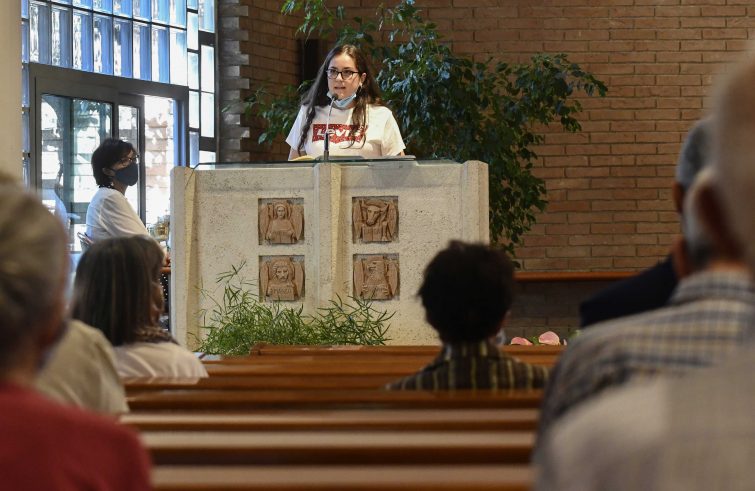
“It is a fair blow to the glass ceiling that women still face today in society, and in the Church”, sociologist Giulia Paola De Nicola thus described the Apostolic Letter issued Motu Proprio “Spiritus Domini,” whereby Pope Francis for the first time grants women access to the ministries of Lector and Acolyte, hitherto the exclusive prerogative of men, in a stable and institutional form and with a special mandate. “Today is a day of joy,” the expert exclaimed: “Some people are bound to be shocked,” but thanks to Bergoglio’s courage, the path has been charted. The issue at stake is women’s participation, for “no one can be excluded from the sacred realm.”
What does this Motu Proprio mean for women?
Today is a day of joy, for many women. The Catholic world encompasses a variety of positions and sensibilities, but – as far as I can see from the first reflections – the majority of women are happy and grateful to Pope Francis for his courage in acting on the inspiration of the Holy Spirit who guides him. Today’s Motu Proprio is an act of rightful recognition. From now on, women will be able to read in Church and the Word of God and perform the service at the altar. In fact, they always have, but in a private form.
The Pope’s decision is inherent to the profile of women as such and is unprecedented: from now on, women’s access to these two ministries is no longer dependent on the respective parish priest or the various changes within the parish, but is an institution per se. It’s a fine blow to that glass ceiling that women face today in society, and in the Church: a gentle, subtle, but very meaningful blow.
How do you think this decision by the Pope will be received?
I expect that some people will be scandalized:
there will be some denouncing the violation of a tradition, others feeling that the Motu Proprio is not in keeping with the previous magisterium. On the contrary, the opposite is true: the fact that each believer was hitherto chosen for these two ministries only by virtue of their male sex was indeed scandalous. That fact is outrageous, and it has been accepted by women in a spirit of unity. The Pope’s initiative bolsters our faith in the works of the Lord, in the successor of Peter and in the whole Church. To all those dissatisfied women in the Church he shows that it takes faith and patience. The Holy Spirit works according to His plan:
in the new Motu Proprio, the Pope restores women’s agency in their being worthy of a relationship with God at the altar. No one can be excluded from the sacred realm.
Today’s Motu Proprio is yet another milestone in the debate on the “new forms of lay ministry” called for at the close of the Synod on the Amazon.
Francis has made this a priority theme since the beginning of his pontificate, with a focus on the role of women. While there have been difficulties- the Church comprises the opinion of many- with this Motu Proprio the Holy Father has indeed manifested the courage bestowed upon him, both as a Pope and as a human person: we can see this from his personal experience, from the manner in which he served as Jesuit Provincial for Argentina, inter alia. As stated in Evangelii gaudium, it is a matter of initiating processes, of listening to the opinions of others, but at some point it is also necessary to make decisions, if not, it means slowing down the process.
Declericalization, along with increased participation of women “in organization and decision-making.” Is this practice already in place for the ecclesial community?
I personally believe that there is still a long way to go, both in this area and in what the Holy Father refers to as “reciprocity” between the ordained ministry and lay ministries, especially women’s ministries. Small steps are being taken, but we are following the direction of the Holy Spirit: our task is to gather its palpitations, the fruits it will yield each time. As Pope Francis teaches us, in the Church, unity is more important than doctrine.
And Synodality is not about thinking alike but proceeding together in the same direction.
In your opinion, how does the Motu Proprio relate to the work done by the Commission on the women’s diaconate, established by the Pope, and to the question of the ordination of women?
Interesting and noteworthy, in my view, is the fact that the Pope does not explicitly mention this in the Motu Proprio. He doesn’t say “no”, he doesn’t touch on the subject. In the document, he states that he has consulted the various dycasteries. In other words, he has acted according to a synodal style, based on listening and marked by collegiality and unity. Everyone was encouraged and given the opportunity to express themselves openly – it’s the parrhesia Francis has repeatedly called for in his pontificate – but then the final word rests with the successor of Peter. The starting point was the requests made at grassroots level, by the ecclesial fabric in its varied and concrete nature.










